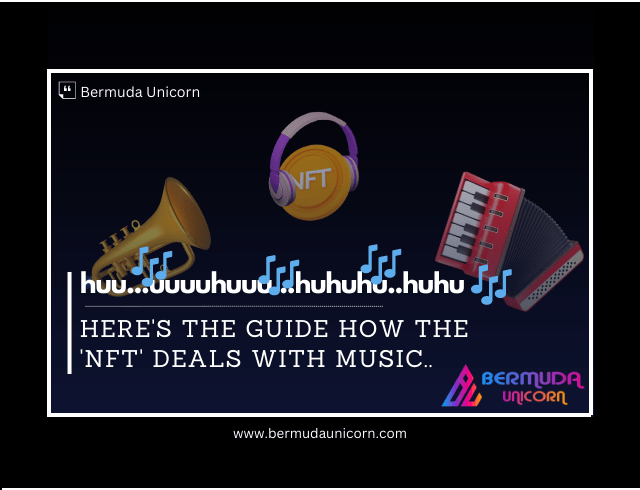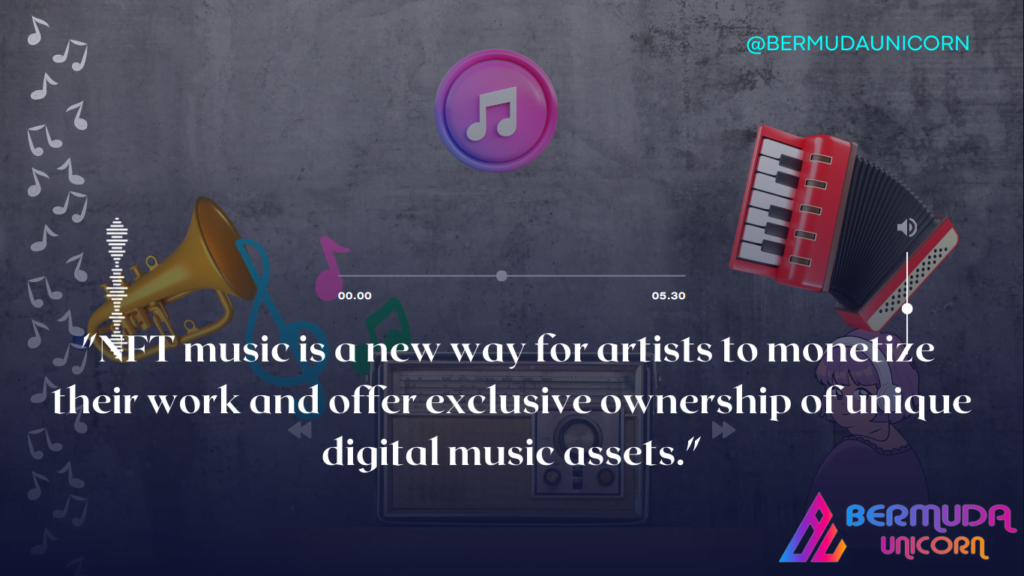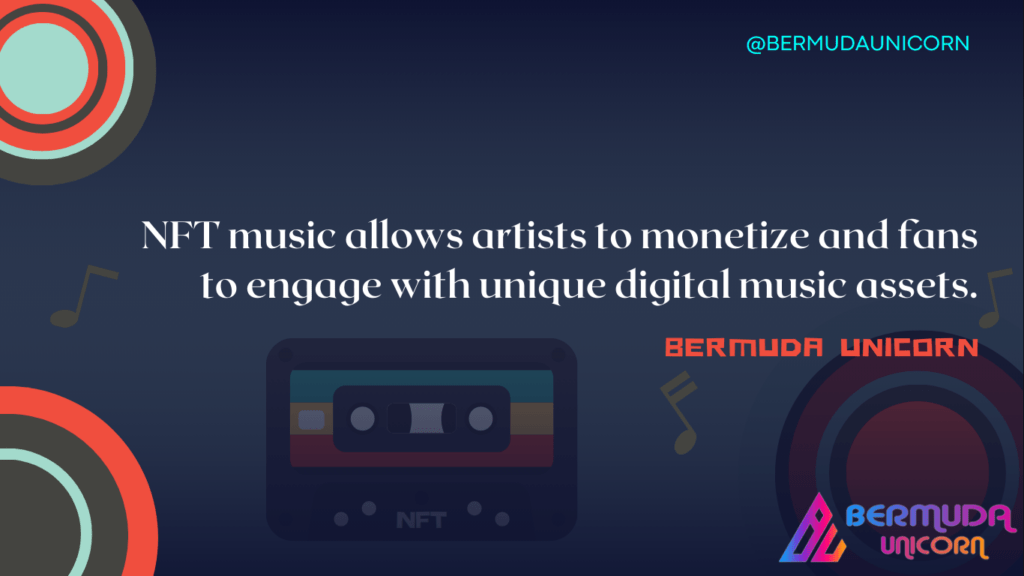![]()

Non-Fungible Tokens (NFTs) are revolutionary tools that have recently taken the music industry by storm. NFTs provide a variety of benefits to both musicians and their fans, from increased publicity and fan engagement to the ability to directly monetize music. This article serves as a beginner’s guide for unlocking the power of NFTs for music. The world of Non-Fungible Tokens (NFTs) has been making waves in the music industry as of late, with big names such as Grimes and Kings of Leon embracing the new technology to push the boundaries of their art. NFTs have created a whole world of new opportunities for artists and their fans to interact in unprecedented ways. However, what exactly are NFTs and how do they function?
What are NFTs for Music?
NFTs, which stands for Non-Fungible Tokens, offer a means for artists to tokenize their music and market it as digital collectibles for sale. This means that they can issue individual copies of a song or album as a limited edition asset, allowing them to set their own pricing structure and have more control over their revenue streams. NFTs also allow buyers to purchase ownership of an artist’s work without worrying about copyright infringement or piracy.
In addition to providing new revenue streams for creators, NFTs are also used to create unique fan experiences. For example, an artist could offer exclusive access to unreleased tracks or special concert passes with the purchase of an NFT. Artists can even link physical rewards such as t-shirts and vinyl records with their digital assets, offering fans a truly unique experience that is tailored directly to them.
Finally, NFTs are being used by labels and streaming services alike in order to incentivize users who want access to early releases or exclusive content from their favorite artists. Creating limited edition tokens tied directly into pre-release albums or physical merch items, labels, and streaming services can reward loyal fans while also driving additional sales of physical products.
Music Industry Potential

The music industry continues to explore ways to leverage NFTs and blockchain technology to create new streams of revenue. This has the potential to open up entirely new markets for musicians, allowing them to reach wider audiences and monetize their work in ways that were not possible before. By leveraging smart contracts, artists can easily manage royalties, agreements between themselves and labels, as well as distribution rights in a secure environment. Furthermore, NFTs enable fans to purchase collectible items such as digital art pieces or exclusive access passes with cryptocurrency payments. With NFTs offering unprecedented levels of control over ownership of assets and intellectual property rights, the music industry is able to build completely new models for creators’ economic empowerment. Additionally, users can use NFTs for ticketing systems that are immutable and secure from counterfeiting. This allows venues and promoters to create more interactive experiences for their customers while ensuring accurate accounting of sales records and real-time insight into attendee behavior patterns. In short, the potential impact of harnessing NFTs in the music industry is profound; it could revolutionize how musicians interact with their fans while creating an entirely new market segment altogether.
Exploring Existing Platforms
When it comes to exploring existing platforms, the first and most obvious choice is Ethereum. This public blockchain-based platform is well-known for its use of smart contracts, which allow users to trade digital assets quickly and securely. Ethereum also uses Ether tokens as its native currency, making it an ideal choice for creating and transacting in NFTs. Additionally, Ethereum is compatible with a wide range of wallets, providing users with plenty of options when it comes to storing their tokens.
Another popular platform for exploring existing NFTs is Flow. Developed by Dapper Labs, the same team behind CryptoKitties, Flow offers a variety of features that make it perfect for trading digital assets like music files or artwork. The platform’s innovative virtual machine allows developers to create custom applications on top of the network, meaning artists can easily create their own marketplace where fans can buy and sell their music files or art pieces as NFTs. Finally, Flow provides users with high levels of security and scalability while still being relatively easy to use compared to other platforms such as Ethereum or Bitcoin Cash.
Blockchain Benefits for Musicians
Blockchain technology provides musicians with a number of benefits, from improved copyright management to monetization of their digital works. Through the use of NFTs, blockchain technology can help musicians secure ownership and control over their intellectual property rights. By assigning unique tokens to each track or album, it enables them to keep track of who owns what and ensure that their music is properly attributed to them.
The digital distribution capabilities provided by NFTs also allow for faster and more efficient payments for streaming services like Spotify or Apple Music. This allows artists to gain quicker access to revenue generated by streams while allowing consumers easier access to the content they want. Furthermore, this provides an incentive for music producers as they receive a cut in profits when someone purchases one of their tracks in an NFT form. Finally, blockchain technology can also be used as a platform for crowdfunding campaigns that raise funds directly from fans so musicians can focus on creating new music instead of worrying about traditional marketing expenses or finding investors.

Building a Fanbase with NFTs for music
NFTs are an incredibly powerful tool when it comes to building a fan base. They can be used to create a sense of exclusivity and value around digital content that fans wouldn’t have access to otherwise. With NFTs, artists can monetize their work and give fans the opportunity to own something that is truly unique and irreplaceable. Additionally, NFTs are also great for providing incentives for fans to engage with their favorite artists by offering exclusive experiences or collectibles that come with their purchase. This could be anything from signed albums, special artwork, or even VIP tickets to shows. As the technology continues to evolve, more innovative ways of engaging with both new and existing fans will continue emerging with NFTs at the forefront.
Driving Revenue with NFTs for music
Non-fungible tokens (NFTs) have the potential to revolutionize the music industry by providing artists with new ways to generate revenue. With NFTs, artists can create unique digital assets that are stored on a blockchain and can be sold directly to their fans. This allows them to retain a larger percentage of the profits from sales than they would otherwise receive through traditional music streaming platforms. Additionally, NFTs can be used to create exclusive experiences for fans and build deeper relationships between artists and fans. For example, an artist could use NFTs as an incentive for fans who purchase physical merchandise from their store or donate money directly towards their projects. Artists can also use NFTs as rewards for participating in live events such as virtual concerts or online listening parties. Finally, artists can leverage the power of social media marketing to promote their NFT offerings and reach new audiences. By doing so, they will be able to further monetize their music career and drive more revenue from their fanbase.
Conclusion: Unlocking New Possibilities
Non-fungible tokens (NFTs) have the potential to revolutionize the way music is created, distributed, and consumed. Through this innovative technology, musicians and composers can now create unique digital assets that can be bought, sold, or exchanged on a secure platform. This allows them to gain financial benefits from their work while simultaneously providing greater control over how their intellectual property is used. Furthermore, NFTs provides an opportunity for artists to connect more closely with their fans by creating personalized digital experiences for them. As the use of NFTs continues to grow in popularity, it will open up new possibilities for musicians and composers who are eager to explore new business models and monetization strategies.
